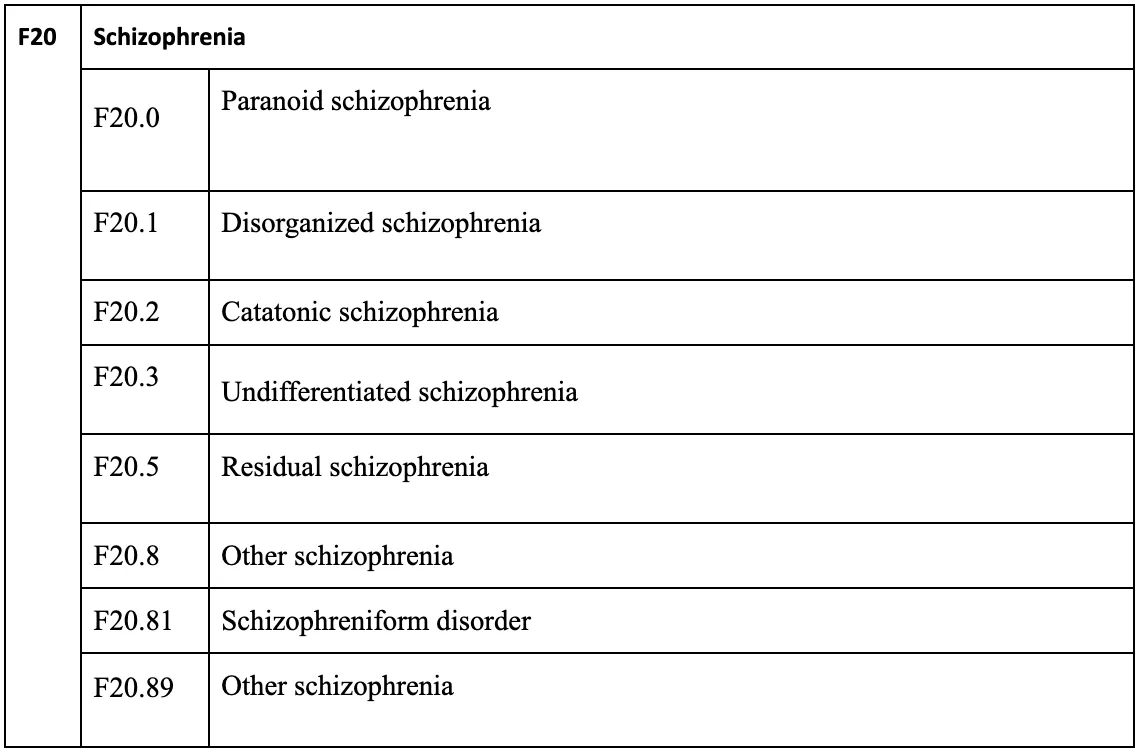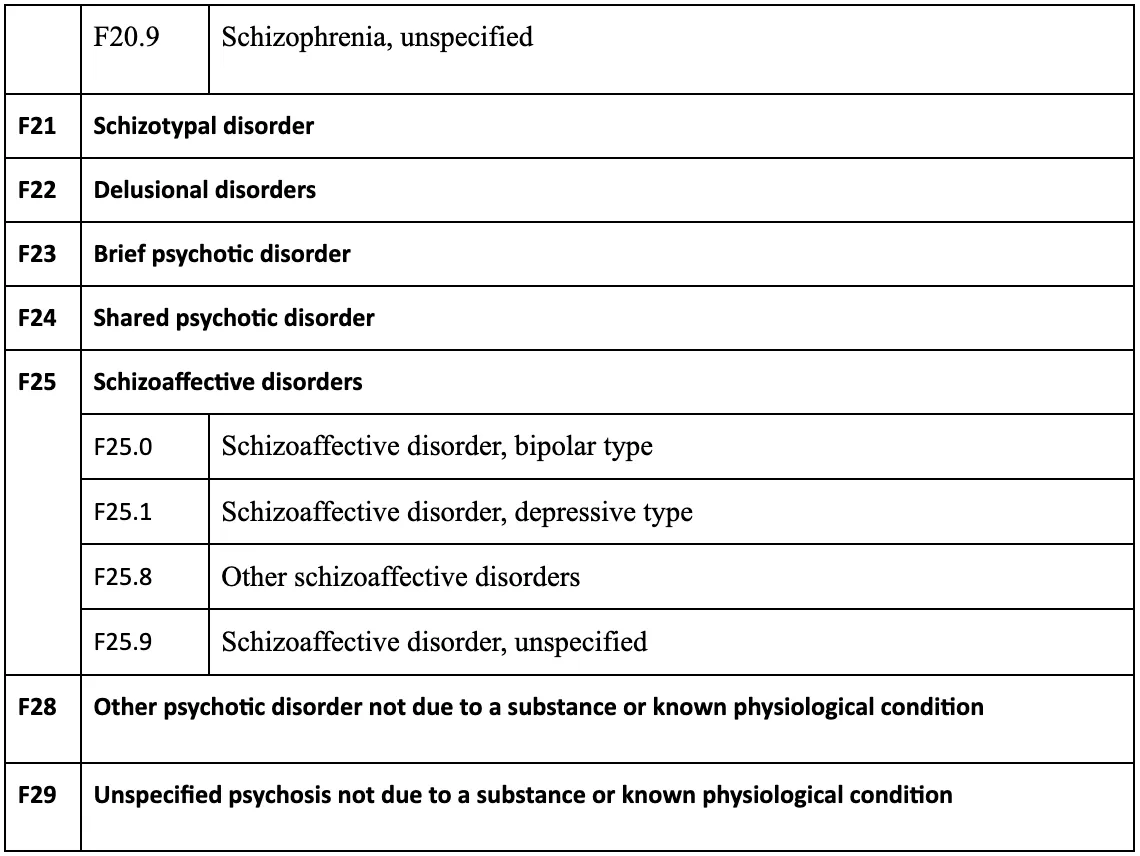Your session is about to expire
Schizophrenia ICD 10 Code
Refresher: What are ICD-10 codes?
ICD is the 10th revision of the International Classification of Diseases. This system consists of alphanumeric codes that categorize and classify the following:
- Symptoms
- Diseases
- Complaints
- Procedures
- Abnormal findings, etc. [1]
While it is currently under the maintenance of the World Health Organization, the system first came about in the 19th century. ICD-10 codes are mainly used by the healthcare industry for the following purposes.
- Accurate diagnosis of medical conditions
- A common language for everyone in the healthcare industry
- Billing and reimbursement assistance
Through a common language, the world is able to categorize, compare and share data in a standard way. In addition to this, these codes also help in collecting and storing data for analysis and decision-making.
Researchers, nurses, physicians, coders, policymakers, insurers, and health information managers use ICD 10 codes across the world. Currently, the system is available in 43 languages. Many countries use it primarily for getting mortality data [2].
ICD-10 codes F01 – F99 are used for mental, behavioral, and neurodevelopmental disorders [3].
What is the ICD 10 code for schizophrenia?
Schizophrenia is a mental disorder with symptoms such as hallucinations, delusions, disorganized speech, difficulty in thinking, etc. While it only affects less than 1% of the population in the US, it can hinder your ability to perform day-to-day tasks [4].
An accurate schizophrenia diagnosis is the first step to treating it. While there is no cure for this disorder yet, researchers are looking into safer and more innovative treatments/therapies. There's also a greater focus on genetics and behavioral research through advanced imaging.
Before proceeding, it's important to establish that schizophrenia is not a split personality or multiple-personality disorder. The symptoms of schizophrenia come under three major categories:
- Positive
- Negative
- Disorganized
Positive symptoms consist of hallucinations (such as seeing things or hearing voices that do not exist), distorted beliefs, and paranoia. Negative symptoms mainly include a loss in the ability to speak or express emotions. Disorganized symptoms consist of disordered speech and thinking, confusion, abnormal movements, and bizarre behavior.
Schizophrenia symptoms in men usually start in the early 20s or late teens. For women, the symptoms usually start to appear often in the mid-20s to early 30s. Researchers are still on the fence about what causes schizophrenia, but brain chemistry and genetic makeup play a critical role.
The ICD 10 code for schizophrenia is F20, which comes under the “schizophrenia, schizotypal, delusional, and other non-mood psychotic disorders” category.
Further specifications are detailed below.
Schizophrenia ICD 10 code: C20
Schizophrenia ICD 10 code C20 lookup
The table below lists the ICD-10 codes for schizophrenia, schizotypal, delusional, and other non-mood psychotic disorders from F20-F29.
F20-F29: Schizophrenia, schizotypal, delusional, and other non-mood psychotic disorders


Types of schizophrenia under F20
The ICD 10 code F20 covers different types of schizophrenia, such as [5]:
- Paranoid schizophrenia
- Disorganized schizophrenia
- Catatonic schizophrenia
- Undifferentiated schizophrenia
- Residual schizophrenia
- Schizophreniform disorder
- Schizophrenia, unspecified
Schizophrenia spectrum disorders excluded from ICD-10 F20
Schizophrenia disorders mainly come under the code F20. However, other disorders on the schizophrenia spectrum come under F21-F29. This is because they don’t fully qualify to be under F20.
For example, schizotypal personality disorder does not include hallucinations and delusions, and it usually co-occurs with mood disorders. Hence, it has an alternative code [6].
Similarly, those with delusional disorders don’t come under F20 because they don’t have symptoms other than delusions. In addition to this, delusional disorders are rare, and they don't affect daily functioning the same way as schizophrenia.
Conclusion
The ICD-10 code for schizophrenia depends on several factors, including the symptoms, their severity, and their occurrence with symptoms of other disorders. While it broadly falls under ICD-10 F20, other disorders with similar symptoms also fall between F21 and F29.
It's important to be careful with codes, especially when it comes to diagnosing schizophrenia. Since the disorder has symptoms that tend to be very similar to symptoms of other disorders, the code assigning should be done with utmost care.
Therefore, it is important for healthcare professionals to clarify the specifics of a patient’s case for accurate reporting and documentation. This includes:
- Noting down each symptom
- Analyzing other disorders with the same symptoms
- Mentioning any complications
- Stating underlying conditions
- Suggesting possible treatment courses
- Highlighting pre-existing issues that may be worsening the symptoms